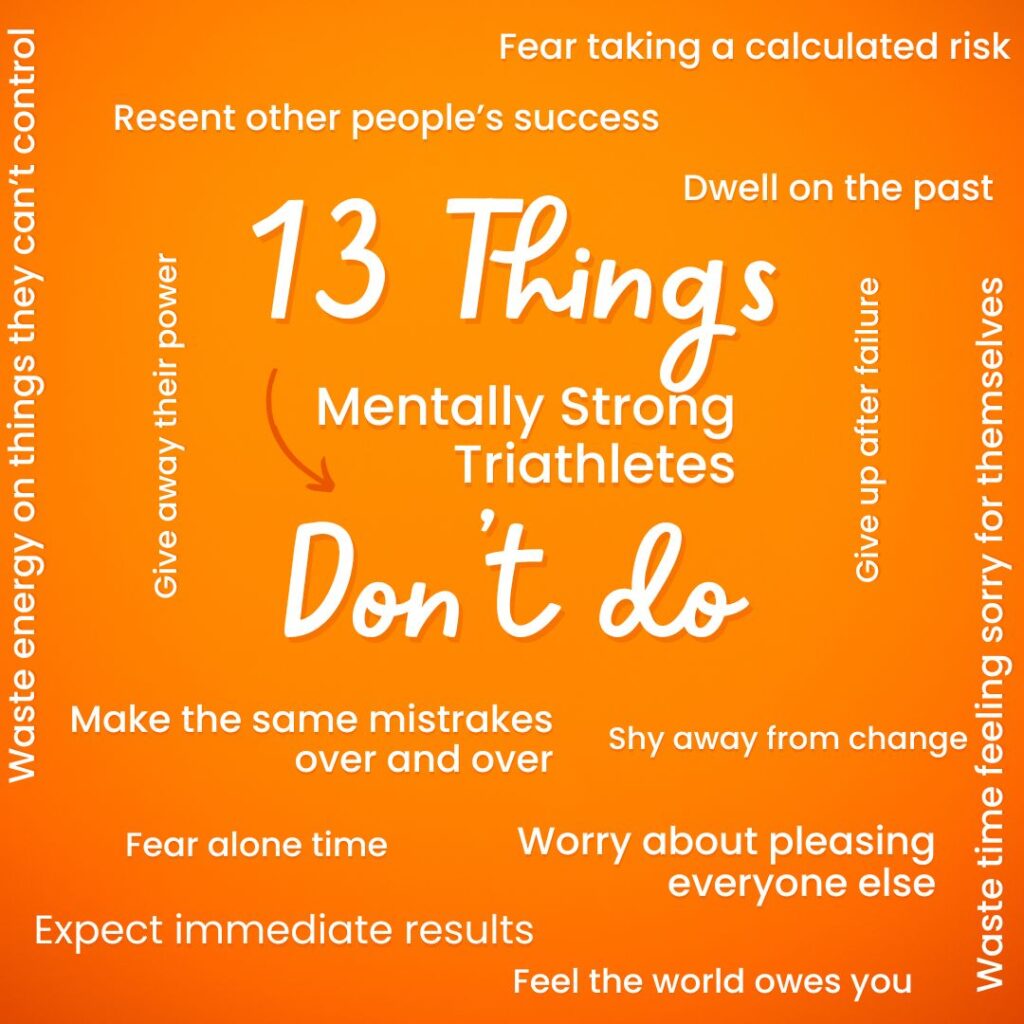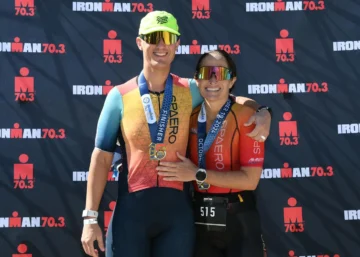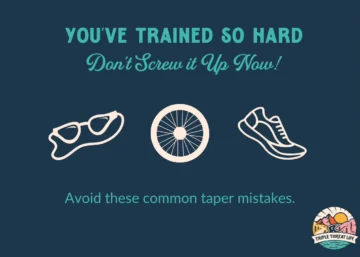
I love books. Take me to a bookstore and I can spend hours searching for the perfect title… Just ask my husband.
On my last trip to the bookstore, I picked up a little, red book called: 13 Things Mentally Strong People Don’t Do by psychotherapist, Amy Morin.
Published in 2017, the book was based on a letter that Morin wrote to herself after losing her mother when she was 23 and her husband when she was 26. She published the letter online and it went viral, inspiring multiple global bestsellers, a Ted Talk with 23+ million views, and speaking engagements.
The book focuses on ways we can cultivate mental strength, or rather the habits that prevent us from doing so. It’s about how to take back your power, embrace change, face your fears, and train your brain.
She’s also written 13 Things Mentally Strong Women Don’t Do, 13 Things Mentally Strong Parents Don’t Do, 13 Things Mentally Strong Kids Don’t Do, and 13 Things Mentally Strong Couples Don’t Do.
You can probably see where I’m headed with this… 😉
For today’s post, I decided to take Morin’s 13 principles and examine how we can apply them as triathletes.
Why Mental Strength?
Mental strength is one of my favorite topics to cover on the blog. Check out these recent posts.
- What if the Swim Gets Cancelled? How to Resist the Trap of What-If Thinking
- Building Resilience and Mental Toughness in Triathlon
- Our Words Matter: How Self-Talk Can Improve Performance and Confidence
- Phrases to Remove From Your Triathlon Vocabulary
Also, I had the fun opportunity to go on Ciara Stockeland’s Inventory Genius podcast to talk about mental resilience in triathlon.
13 Things Mentally Strong Triathletes Don’t Do
1.They don’t waste time feeling sorry for themselves. This reminds me of something my husband likes to say when I tell him that something isn’t fair.
He says, “The fair is in Tampa.” Apparently, that’s the only fair we should be concerning ourselves with, because of course life isn’t fair.
While we don’t always have control over what happens in life, we can control how we respond to adversity.
I touched on this last week in What if The Swim Gets Cancelled? How to Resist the Trap of What-If Thinking. When the unexpected happens in triathlon (and it will) you have a decision to make.
Are you going to have a pity party and whine about what might have been? Or are you going to make a new plan and move forward doing the best you can with the hand you’ve been dealt?
Consider this scenario: During a race, you get a flat tire. Is that fair? Not not really, and it sucks to boot. But you’ve got two choices.
Option A: Sit on the side of the road and cry. Option B: Put your big girl pants on, change the flat, and get back to racing. Only one of the options will get you closer to the finish line.
2.They don’t give away their power. We give away our power when we let other people’s opinions define what we think about ourselves, even if it’s not based in reality.
Along with competition comes comparison, and there will always be people who minimize the accomplishments of others because, in their humble opinion, it wasn’t fast enough, impressive enough, or special enough.
In this day and age, it happens online as well. While online forums like Strava, Zwift, and Instagram can be good for motivation and connection, they have a dark side that can be damaging to our confidence and self-worth if we don’t take them with a grain of salt.
What can we do? Establish healthy boundaries. Stop trying to prove people wrong. Don’t let your self-worth be dependent on other people’s opinions.
While you can’t control the actions of other people, you can control how you choose to respond.
3.They don’t shy away from change. Personally, I’m not a big fan of change. I like my routine. Most athletes do.
I like doing brick workouts on Tuesday and Thursday and swims on Monday, Wednesday, Friday. I like doing a long ride on Saturday and a long run on Sunday.
Any disruption to my schedule is annoying, but I can deal with it. But there are bigger changes that happen in life- moving, starting a new job, or getting married.
As athletes, and human beings, we have to believe in our ability to adapt when change happens. Changes to our training environment, coaching, schedule, club dynamics, mindset, and strategy can directly affect our performance.
Whether you thrive under new conditions, or struggle, all depends upon your ability to adapt and be resilient to change.
4.They don’t waste energy on things they can’t control. In triathlon, people like to talk about controlling the controllables. But what does that even mean?
Think about the factors you can control during a race: your mindset, effort level, proper pacing, and execution of a nutrition plan. Uncontrollable factors are things like the weather, course terrain, the performance of other athletes, or an equipment malfunction.
The human body and mind have a finite amount of resources at any given time, especially during a race. These are physiological resources like blood flow, oxygen, and energy, as well as cognitive resources like focus and mindset.
When we get distracted by things we can’t control, that diverts our attention away from the task at hand, which can result in poor performance. This also wastes valuable resources that the body could be using elsewhere to help us perform at a high level.
5. They don’t worry about pleasing everyone- I’m a people-pleaser. It likely stems from my perfectionist personality, self-imposed high standards, and a psychologically abusive coach I had in my younger years. But regardless of the cause, the result is that I like to make everyone happy.
In an athletic sense, this might look like wondering what my coach will think of my performance while I’m still racing… (Not great, I know, but I’m working on it.)
For a professional athlete, this might look like worrying about the expectations of fans, the pressure to please sponsors, or scrutiny from the media. Amateur athletes might worry about pleasing their family and friends, who have invested time, effort, and resources into their athletic journey. And don’t even get me started on social media.
But it’s important to realize that we don’t need to please everyone. It’s not your job to make everyone else happy.
You aren’t responsible for what others think of how you train, how fast or slow you are, or race results. You’re only responsible for the effort you put forth and how you feel about yourself as a result.
6.They don’t fear taking a calculated risk. Taking risks is an integral part of racing, especially when it comes to pacing.
For a long distance race, you have to be in tune with your body so you know when to push and when to hold back. For a shorter race, you have to race hard enough so you can reach your potential, but not too hard so you risk blowing up. (I’m still working on this).
The art of taking risks is something I talked to Jan Frodeno about in this Triathlete Magazine interview. “Don’t just go to a race and see what might happen. You’ll set yourself short, not because the bar is set too high, but because it’s so low the the danger is tripping over it.”
Taking risks isn’t about being foolish, but being calculated. All too often we think of taking a risk as having a negative connotation, but don’t forget that risks can pay off big.
7.They don’t dwell on the past. As athletes, we need to be able to acknowledge the past and learn from it.
For example, if you made an error in your race nutrition that caused you to get sick, or you over-biked so you had no energy for the run.
It’s important that we learn from our mistakes. But if we waste time dwelling on what’s happened in the past, that can detract from what we’re doing in the present, which will affect how we perform in the future.
8.They don’t make the same mistakes over and over. Author Rita Mae Brown wrote: “Insanity is doing the same thing over and over again, but expecting different results.”
All athletes make mistakes. It’s an essential part of learning and growing as a competitor.
I learn something about myself every time I race, whether it’s about mindset, performance, or execution. Sometimes, I learn more when things don’t go well than when they do.
Started out the run too hot and blew up before the finish. Been there.
Didn’t drink enough on the bike and got dizzy. Done that.
Forgot to look at my heart rate and overheated. That was a fun race.
As athletes, we shouldn’t be afraid to make mistakes. But we need to make sure that we learn from those mistakes and refine our skills, which will lead to greater confidence, resilience, and improved performance.
9.They don’t resent other people’s success. Just because someone else succeeds, that doesn’t mean you’ve failed.
So when you find yourself on the second place step instead of the first, that simply means another athlete was faster on that day. You could’ve done everything in your power to execute the perfect race and still come up short, and that’s ok.
The mark of a truly great athlete, and person, is being able to acknowledge the success of a fellow competitor, while also recognizing that it has no impact on your own self-worth.
10.They don’t give up after the first failure. Do you view failure as final? Or as an opportunity to grow, learn, and improve?
I find that most triathletes don’t have much quit in them, or they would’ve picked a less crazy sport. But it’s not just failure in a broad sense; it’s the little things we let creep into our psyche over time.
For example, my husband isn’t a big fan of swimming. He isn’t bad at swimming by any means. It just doesn’t come as easy to him as cycling and running. So by comparison, swimming is his weak link. Therefore, his self-identity has become that he’s just not a good swimmer. But is this really a true statement, or a self-fulfilling prophecy?
We all have strengths and weaknesses as athletes, but we can take a proactive approach by viewing “weakness,” not as a liability, but as an opportunity for growth.
11.They don’t fear alone time. My favorite part of training for triathlon is going on long bike rides with my friends. For many people, the social aspect of training is what attracted them to triathlon in the first place.
But when you race, it’s a solo endeavor. Sure you’re surrounded by cheering spectators and fellow athletes, but you’re responsible for your own performance.
In a race like an Ironman, you have to feel comfortable being with your own thoughts. Sometimes, it’s lonely and isolating on that 112-bike ride or the later stages of the marathon.
You have to be ok with the thoughts in your head, without the distraction of music or outside motivation, because that’s the only thing that’s getting you to the finish line.
12.They don’t feel the world owes them anything. If we view “the world” as a race, then this can apply to triathletes as well. No matter how diligently you’ve prepared and how much time you’ve dedicated to training, the race doesn’t care.
It owes you nothing.
Nothing is guaranteed, so it’s dangerous to approach a race feeling like you’re entitled to something. “Well, I can swim, bike, run X so I should place in the top X and get my spot to X World Championship…”
That’s a good way to get humbled, real quick.
13.They don’t expect immediate results. I’m lucky to have coaches who’ve been in the business for 40 years, so they know how to achieve results, while also maintaining longevity in the sport.
So many athletes want what they want and they want it right now! The image that pops into my head is of that spoiled rotten, little girl in Willy Wonka and the Chocolate Factory. Triathletes, please don’t act like Veruca Salt.
“I want to win my age group.”
“I want to do a sub 9 hour Ironman.”
“I want to get a half marathon PR, but I also want to do every sprint triathlon in town, and I want to qualify for Kona too, and why not qualify for Boston while we’re at it.”
Not to mention the unrealistic expectations, having an unrealistic timeline is where so many athletes get into trouble. That can lead to injury, burnout, and disappointment.
Everyone wants the quick fix. What’s the latest wetsuit, high tech bike, or super shoe that’s going to shave seconds off my time?
I’ve learned over the years that more than any other sport, improvement in triathlon takes time. Not days, or months, but years.
Despite what some people might tell you, there’s no special workout that’s going to make you dramatically faster, stronger, better in a few weeks time.
Can you see improvement in a short period of time? Definitely, especially if you started from ground zero. But understand that real physiological change takes time.
I like to say that the work I put in during the off-season is what really shows up at next year’s races.


